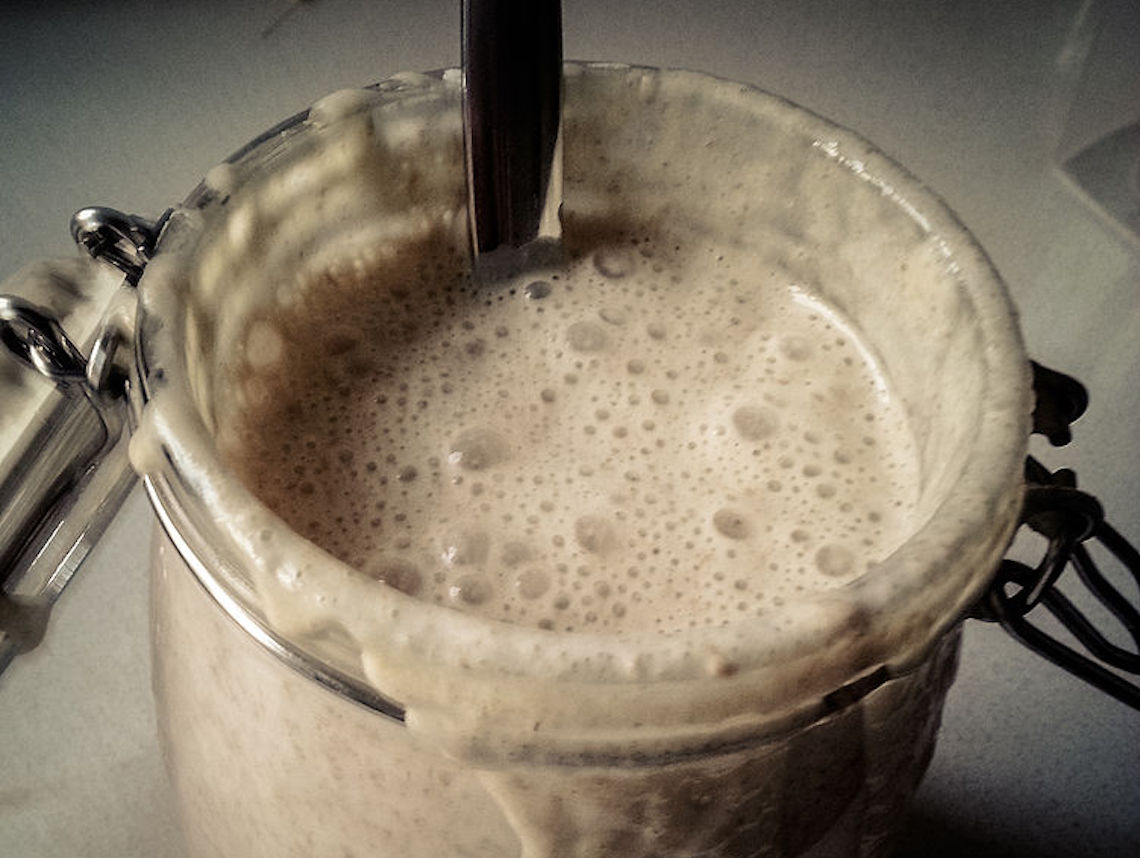
Two weeks ago, when the rains finally stopped and the sun appeared in a brilliant blue sky, I took my sourdough starter outside for some fresh air. I sat on a bench in the garden and read a book. My starter sat beside me.
After a while, my wife came out.
“What are you doing?”
“Reading.”
“No, I mean, what’s that?”
“My sourdough starter.”
She was kind enough not to say, “You’re so weird.” But I’m pretty certain she was thinking it.
Each week when I make bread, I use the starter. I created it nine months ago, mixing a few tablespoons of freshly grown local wheat and water in a large mason jar, and setting it aside, uncovered, on my kitchen counter. The next day I added a little more flour and water.
After about a week of these incremental additions, the slurry bubbled and frothed. Wild yeasts, ever present in our air, had landed in the starter and multiplied. Tiny bubbles appeared where the gasses formed by the yeasts tried to escape. When I lowered my nose to the jar, it smelled like the tank room of a winery. A really good winery.
From that day on, to make bread, I only had to combine a portion of the starter with some flour, water and salt, stir it into a lump, let it sit overnight, and the next day, bake it into a beautiful loaf. I do about 10 minutes of work, total. Those wild yeasts do all the rest.
To replenish my starter, I add more fresh flour and water, then let it sit out again, until the yeasts gather and activate. Sandor Katz, the modern-day guru of fermentation, once wrote that he likes to take his sourdough starter outdoors so it can collect the various local yeasts that may not make it as far as his kitchen counter. Los Angeles forager Pascal Baudar said that he often takes his sourdough along with him when he goes for a walk in the woods. I figured I would do no less for mine.
I started making sourdough bread in college — my first job as a junior was turning out 10 loaves each day for a local bakery. It has a pure taste, simple ingredients, and the probiotic fermentation makes the bread more digestible and better for you. Most other bread tastes cottony and dry to me.
But our ancestors ate sourdough bread because they didn’t have a choice. If you want to know why the Israelites couldn’t wait for their bread to rise, it’s because natural leavening takes a long time to do its magic. Until two Hungarian Jewish immigrant brothers named Charles and Maximilian Fleischmann came up with commercially produced yeast in 1868, all bread was based on starter cultures like mine.
To keep a starter culture alive and healthy, you must feed it daily, keep it at a comfortable temperature, protect it from contamination, and occasionally nurse it back to bubbly life. What I am telling you is that, yes, I have an I-Thou relationship with my blob of sourdough starter. I am sensitive to its needs. I feed it; it nourishes us.
And now comes Passover, when we are commanded to forgo any leavened thing. In our kosher home, that means all yeast products, all flour, anything with leavening, must go. I would ask my wife, the rabbi, if that means the starter too. Except I already know the answer.
After nurturing my baby for nine months, I figure I have to use it all at once or toss it. As we say in Venice, this bums me out. I ask that age-old question of an inscrutable God: Why?
Until you actually make bread like your Israelite ancestors did, it’s hard to understand what lesson there is in prohibiting leavening.
Israelite slaves escaping Pharaoh’s army didn’t have time for their bread to rise, the Passover liturgy tells us. Remember you were once slaves. So don’t eat bread, or anything remotely like it.
That’s the reason the rabbis always give us — it’s right there in the story. I turned for answers to my sourdough guru, or rabbi, Sandor Katz.
“I’ve vaguely understood it to be a metaphor for remembering a time in exile and in transit, without even a place/time to let dough rise, which of course would also imply no place/time to let grape juice ferment (or to grow grapes for that matter),” he e-mailed back.
But I wanted more. I assume there must be some reason for the reason. Why of all the things the Jews must give up for eight days, God picks yeast? After all, did the Israelites have time to bring their oxen or wine barrels? Why not meat or sugar or alcohol — things that other religions commonly proscribe? We would nod our heads — oh, that makes sense. But yeast?
I have never come across religion that places prohibitions on leavening. If I was going to have to say goodbye to my beautiful 9-month-old bouncing baby starter, I needed to see the deeper meaning behind it.
And precisely because of that starter, I do.
Until you actually make bread like your Israelite ancestors did, it’s hard to understand what lesson there is in prohibiting leavening. But staring at my starter, I’ve come up with three.
First, sourdough culture is a very human enterprise. Humans manipulate nature to make bread. It takes culture to culture. But for the eight days of Passover, we step away from what we humans create, and sit down to what God created. Eggs. Meat. The first greens. We eat what’s fresh and new and pure (even more reason those processed Passover foods are heretical to the holiday). The earth that was dead in winter has come alive in spring — and we had nothing to do with that. Enjoy it, marvel in it, understand it.
Second, baking takes time. Sure, the Israelites could have scooped their starters into their goatskin purses as they fled. But no matter where they went, they would have had to camp for at least a day to let their bread rise. Passover teaches us to live lightly, be ready to move on quickly, live for today in the presence of all you have — leave tomorrow behind.
Finally, in order to thrive, a sourdough culture needs continuity with the past. Yesterday’s starter becomes tomorrow’s, which becomes next month’s. Passover breaks that chain. You toss it all out, you start fresh.
These are lessons no less profound than remembering our redemption, but harder for our modern minds to understand — at least without a sourdough starter around.
As for mine, I figured a solution. Our neighbors will baby-sit the batter during the holiday. I’ll leave them instructions. Feed and water daily. Keep warm. Walks optional.
Happy Passover.
ROB ESHMAN is publisher and editor-in-chief of TRIBE Media Corp./Jewish Journal. Email
him at robe@jewishjournal.com. You can follow him on Instagram and Twitter @foodaism
and @RobEshman.


































 More news and opinions than at a Shabbat dinner, right in your inbox.
More news and opinions than at a Shabbat dinner, right in your inbox.